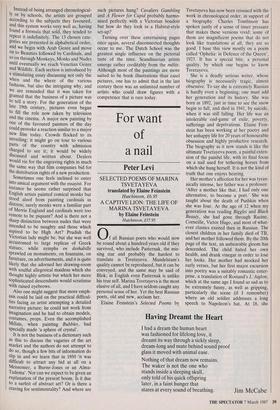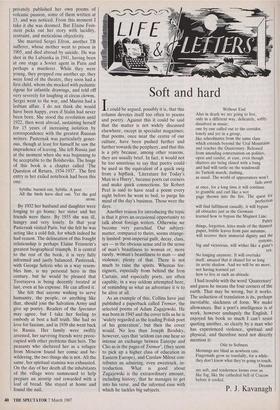For want of a nail
Peter Levi
Hutchinson, f15.95
0 f all Russian poets who would now be round about a hundred years old if they survived, who include Pasternak, the mis- sing star and probably the hardest to translate is Tsvetayeva. Mandelstam's quality cannot be reproduced, but it can be conveyed, and the same may be said of Blok; in English even Pasternak is unlike his true self. Marina Tsvetayeva is the most elusive of all, and I have seldom caught any personal sense of her. Yet the best Russian poets, old and new, acclaim her.
Elaine Feinstein's Selected Poems by Tsvetayeva has now been reissued with the work in chronological order, in support of a biography. Charles Tomlinson has spoken justly of a sense of inner pressure that makes these versions vivid; some of them are magnificent poems that do not look like translations at all, they are so good. I base this view mostly on a poem called `Ophelia: in Defence of the Queen', 1923. It has a special bite, a personal quality, by which one begins to know Tsvetayeva.
She is a deadly serious writer, whose biography is necessarily tragic, almost obsessive. To say she is extremely Russian is hardly even a beginning; one must add her generation and its history. She was born in 1892, just in time to see the snow begin to fall, and died in 1941, by suicide, when it was still falling. Her life was an intolerable end-game of exile, poverty, sufferings and deprivations. Elaine Fein- stein has been working at her poetry and her unhappy life for 20 years of honourable obsession and highly productive research. The biography as it now stands is like the ultimate Tsvetayeva poem, a painful exten- sion of the painful life, with its final focus on a nail used for tethering horses from which she hung herself. It is not the kind of truth that one enjoys hearing.
Her mother's affection for her was tyran- nically intense, her father was a professor. `After a mother like that, I had only one alternative, to become a poet.' She was taught about the death of Pushkin when she was four. At the age of 12 when my generation was reading Biggles and Black Beauty, she had gone through Racine, Corneille, Victor Hugo, and most of what- ever classics existed then in Russian. The closest children in her family died of TB, and her mother followed them. By the 20th page of the text, an unbearable gloom has descended. The child hated her own health, and drank vinegar in order to lose her looks. Her mother had mocked her early verses, but her first major excursion into poetry was a suitably romantic enter- prise, a translation of Rostand's L'Aiglon, which at the same age I found so sad as to be extremely funny, as well as gripping, particularly the scene (if I remember) where an old soldier addresses a long speech to Napoleon's hat. At 18, she privately published her own poems of volcanic passion, some of them written at 15, and was noticed. From this moment I take it she was doomed. But Elaine Fein- stein picks out her story with lucidity, restraint, and meticulous objectivity.
She married Sergei Efron, another TB sufferer, whose mother went to prison in 1905, and died abroad by suicide. He was shot in the Lubianka in 1941, having been at one stage a Soviet agent in Paris and perhaps a murderer. While they were young, they propped one another up; they were fond of the theatre, they soon had a first child, whom she mocked with pedantic rigour for infantile drawings, and told off very severely for laughing at circus clowns. Sergei went to the war, and Marina had a lesbian affair. I do not think she would have been happy, even if Stalin had never been born. She stood the revolution until 1922, then went abroad, sustaining herself for 15 years of increasing isolation by correspondence with the greatest Russian writers: Pasternak was particularly gener- ous, though at least for himself he saw the imprudence of leaving. She left Russia just at the moment when she was beginning to be acceptable to the Bolsheviks. The hinge of this book is a chapter called 'The Question of Return, 1934-1937'. The first entry in her exiled notebook had been this one:
Sybilla: burned out, Sybilla. A post.
All the birds have died out. Yet the god arose.
By 1932 her husband and daughter were longing to go home; her sister and her friends were there. By 1935 she was ill, hungry and very lonely. In that year Pasternak visited Paris, but she felt he was acting like a cold fish, for which indeed he had reason. The delineation of this fraught relationship is perhaps Elaine Feinstein's greatest biographical triumph. It is central to the rest of the book, it is very fully informed and justly balanced. Pasternak, with George Seferis who in a way resem- bles him, is my personal hero in this century, but he would be pleased that Tsvetayeva is being decently treated at last, even at his expense. He can afford it.
She felt that anyone wishing to serve humanity, the people, or anything like that, should join the Salvation Army and give up poetry. Readers of the Spectator may agree, but I take her feeling to embody at best a half truth. She had no love for fascism, and in 1939 she went back to Russia. Her family were swiftly arrested, her surviving friends were preoc- cupied with other problems than hers. The peasants who sheltered her as a refugee from Moscow found her comic and be- wildering, the two things she is not. All the same, her spiritual stamina was exhausted. On the day of her death all the inhabitants of the village were summoned to help prepare an airstrip and rewarded with a loaf of bread. She stayed at home and found the nail.



























































 Previous page
Previous page